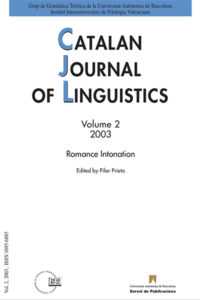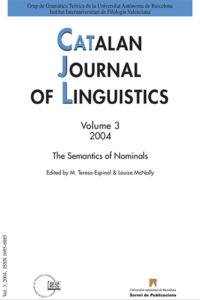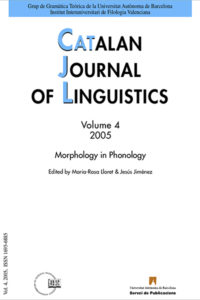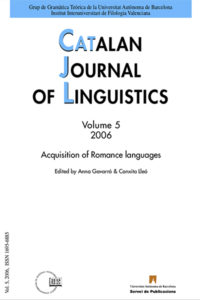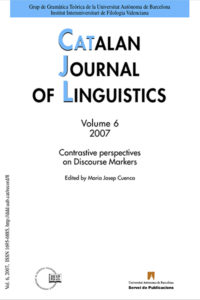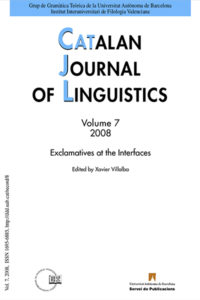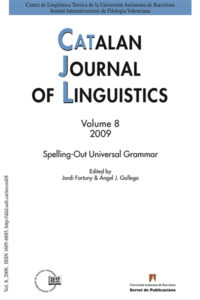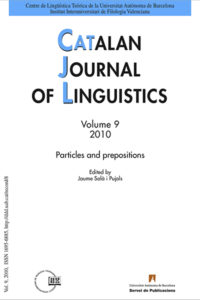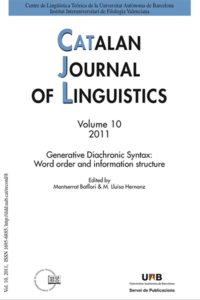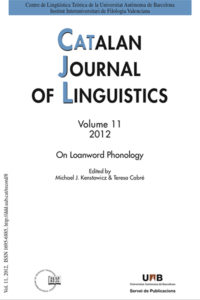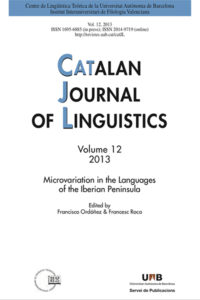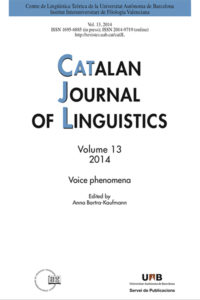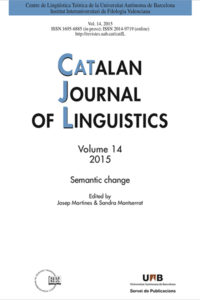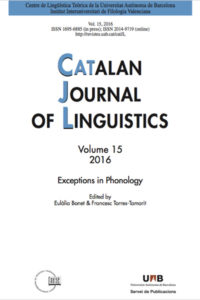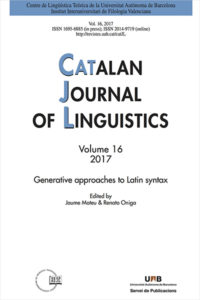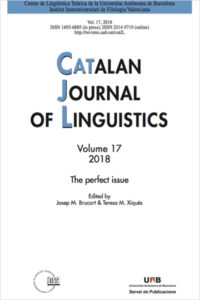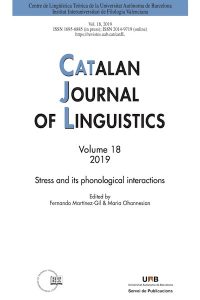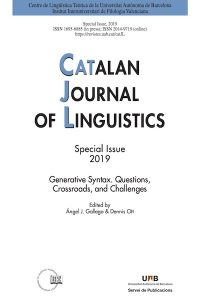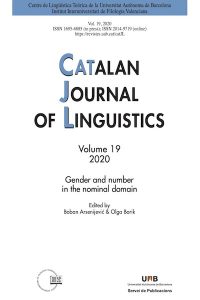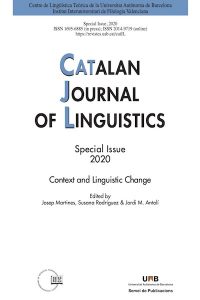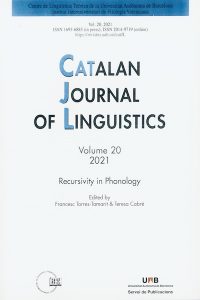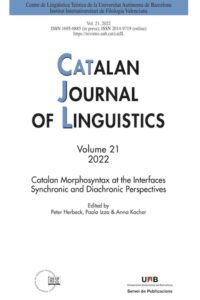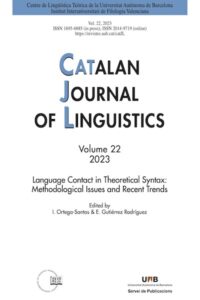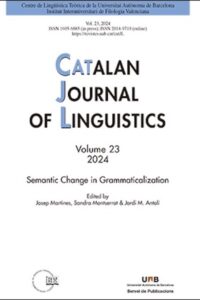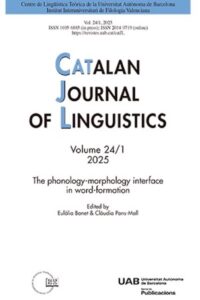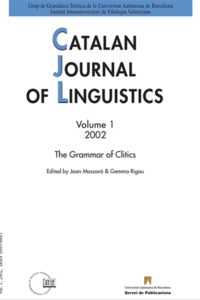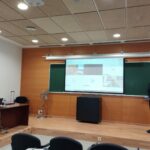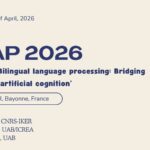25 maig, 2002
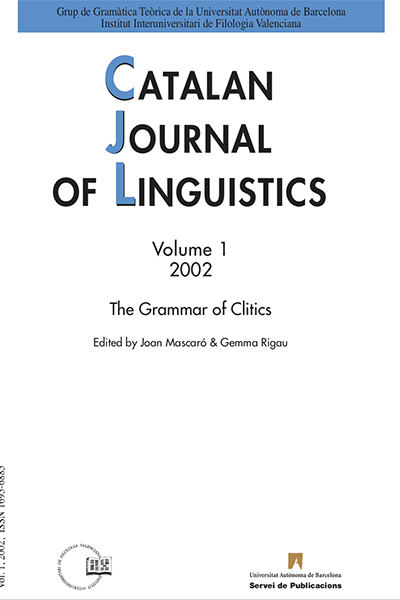
Autors:
Joan Mascaró & Gemma Rigau (eds.)
Títol:
The grammar of cliticsEditorial: Universitat Autònoma de Barcelona, Servei de Publicacions
Col·lecció: Catalan Journal of Linguistics #01Data de publicació: 2002
Pàgines: 259 Text completInterest in clitics originates probably from their special character. As elements which are neither words nor affixes but share some of their properties, they are an especially fruitful ground to test grammatical theories. Such properties include phonological shape, allomorphy, cooccurence restrictions, position in the sentence, and semantic interpretation, thus covering a wide range of phenomena that affect all grammatical components. It is not at all clear whether the notion «clitic» corresponds to some linguistic primitive (or several), although some clitic-related categories, like clitic group as a prosodic category, have been proposed. The general properties of what has been classified as a clitic also varies, depending on the language and the specific clitic analyzed.
Títols de la col·lecció / Also in this series:
25 maig, 2003
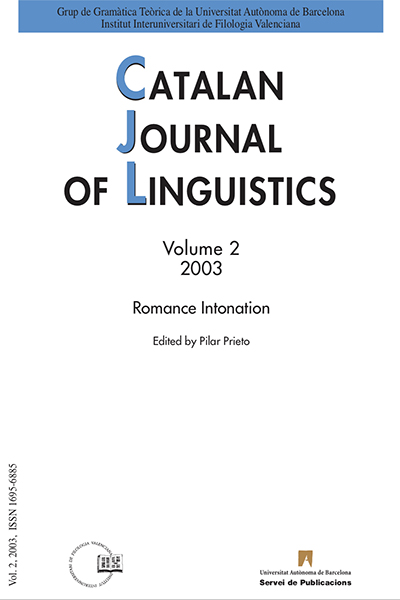
Autors:
Pilar Prieto (ed.)
Títol:
Romance intonationEditorial: Universitat Autònoma de Barcelona, Servei de Publicacions
Col·lecció: Catalan Journal of Linguistics #02Data de publicació: 2003
Pàgines: 283 Text completThe papers collected in this volume are concerned with a wide range of topics which reflect the work that is being conducted at present in this field. They have been written by specialists who devote their current work to describing the intonational systems of Romance languages and to discussing some of the theoretical questions posed in intonational phonology. I trust the volume will contribute to broaden the empirical and theoretical studies of prosody within the Romance area and will spark further interest and inquiry into the area of intonational phonology.
Títols de la col·lecció / Also in this series:
25 maig, 2004
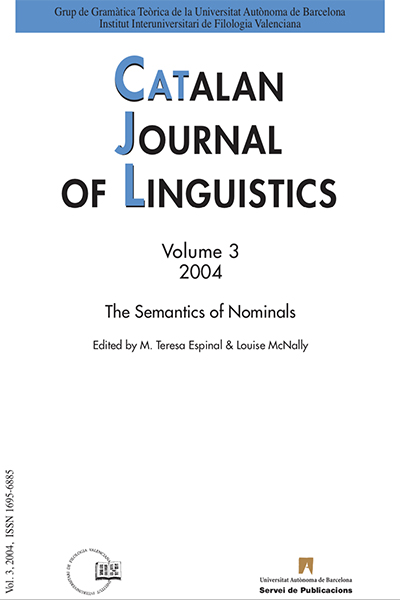
Autors:
M. Teresa Espinal & Louise McNally (eds.)
Títol:
The semantics of nominalsEditorial: Universitat Autònoma de Barcelona, Servei de Publicacions
Col·lecció: Catalan Journal of Linguistics #03Data de publicació: 2004
Pàgines: 181 Text completThis special volume presents a series of papers which all deal with the semantics of nominal expressions.
It has long been clear that the relatively simple picture of the relationship between syntactic category and semantic type on which all noun phrases denote generalized quantifiers, while perhaps feasible to maintain, is an idealization that does little to advance our understanding of the great richness and variety in the semantics of nominals that is attested in the world’s languages. In the last thirty years, this picture has grown progressively more complex along at least two dimensions that we would like to emphasize here.
It should be evident that the study of the semantics of nominals continues to offer many interesting avenues to explore. There is still much work to be done to clarify what exactly incorporation consists in –to what extent it is syntactically and semantically homogeneous cross-linguistically, and what its status is within a model of grammar which pursues simplicity and economy (Van Valin 1999). Work on incorporation and related phenomena has forced rethinking about how semantic composition is achieved and how broad the semantic typology of nominals might be; it also has consequences for our understanding of argument structure. Another rich area involves the sortal domain of noun semantics –some of the papers in this volume present perhaps unexpected proposals for the sortal category of noun phrases, with interesting extensions in the empirical coverage of semantic theory. Yet a third area pointed to by the contributions to this volume involve the discourse-pragmatic aspects of meaning that are conventionalized in the interpretations of noun phrases –perhaps the area in greatest need of development.
Títols de la col·lecció / Also in this series:
6 febrer, 2018
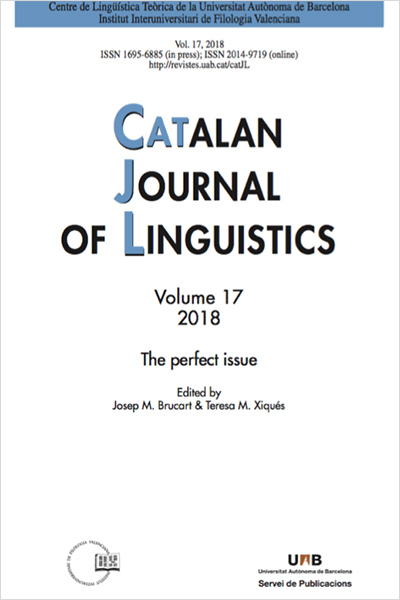
Autors:
Brucart, Josep M. & Teresa Xiqués (eds.)
Títol:
The perfect issueEditorial: Bellaterra: Servei de Publicacions de la UAB
Col·lecció: Catalan Journal of Linguistics #17Data de publicació: 2018
Pàgines: 177 Text completThis volume studies perfect constructions across languages and pays special attention to perfectivity and its relation to the perfect. The issue aims to explore the relation between telicity/perfectivity and the perfect, some points of contrast between the perfect and (im)perfective markers, temporal readings of the perfect and its different degrees of remoteness, the existence of the aoristic drift, present tense lengthening in the perfect, among other topics linked to both notions.
Títols de la col·lecció / Also in this series:
25 maig, 2006
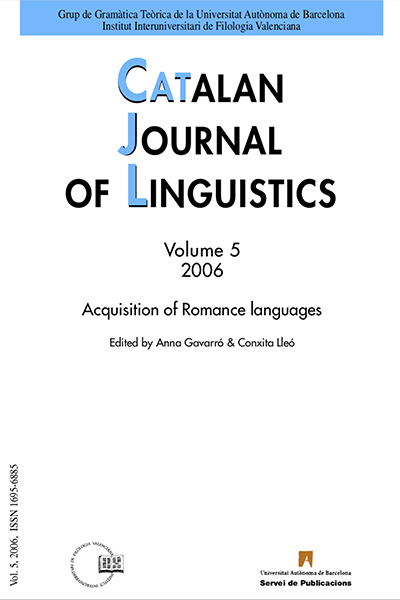
Autors:
Anna Gavarró & Conxita Lleó (eds.)
Títol:
Acquisition of Romance languagesEditorial: Universitat Autònoma de Barcelona, Servei de Publicacions
Col·lecció: Catalan Journal of Linguistics #05Data de publicació: 2006
Pàgines: 276 Text completGenerative grammar addressed for the first time acquisition as a central issue in the study of grammar. This perspective has given rise over the years to a considerable body of work, mainly on first language acquisition, but also on second language acquistion, bilingual acquisition, and the acquisition by children affected by SLI. If we assume continuity, i.e. that all stages in acquisition reflect possible natural languages, we must posit a mutual dependency between grammatical theory and the facts of acquisition. On the one hand, theories about particular languages should pass the proof against data from acquisition. On the other hand, acquisition data may provide a source of evidence for deciding among alternative theories of language.
Within the past twenty years, Romance languages have been an increasing focus of research for theories of language, and the literature on the acquisition of Romance has grown steadily during this time. The moment thus seemed ripe to unify the efforts of several scholars working on the acquisition of Romance languages and devote a special issue of CatJL to the acquisition of Romance, taking into consideration the double perspective just mentioned. We thank the authors and reviewers for making this project possible. The volume deals with the acquisition of the phonology, morphology and syntax in Catalan, French, Portuguese, Romanian and Spanish. The papers dealing with phonology focus on two main topics: the acquisition of prosodic constituents and the interface between phonology and morphology. The prosodic constituents examined are: the syllable (Demuth & Kehoe on consonant clusters in French; Prieto & Bosch Baliarda on codas in Catalan) and the foot (Goad & Buckley on the relevance of the foot in Québec French). The morpho-phonological interface is treated by Fikkert & Freitas (on the relevance of allophony and allomorphy for the acquisition of the Portuguese vowel system), and Lleó (on the dependence of plural marking on phonological acquisition). The papers dealing with syntax focus on the acquisition of pronominal clitics (Babyonyshev & Marin on clitic production in Romanian and Pirvulescu on clitic omission in French) and verb and wh- movement (Costa & Loureiro on verb raising in Portuguese, Hamann on wh- movement in French).
All the papers in this volume show the relevance of formal linguistics to issues in acquisition, focusing on the relationship between representation and acquisition from different perspectives and in different modules of the grammar.
Títols de la col·lecció / Also in this series:


